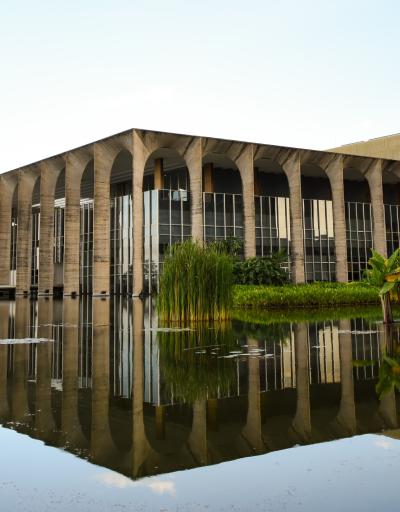
Gender Equality in Brazil
As equal citizens, women and men must enjoy equal opportunities, choices, capabilities, power, and knowledge. Equipping girls and boys, women and men, with the knowledge, values, attitudes, and skills to tackle gender disparities is a precondition to building a sustainable future for all.
Gender Equality in Education
Gender equality is inextricably linked to its efforts to promote the right to education and support the achievement of the Sustainable Development Goals (SDGs).
Through the Education 2030 Framework for Action:
- SDG 4 aims to "ensure inclusive and equitable quality education and promote lifelong learning opportunities for all", and
- SDG 5 aims to "achieve gender equality and empower all women and girls."

UNESCO is committed to promoting equal rights between men and women across education systems and at all levels, from preschool to higher education, in formal and non-formal structures, and all areas of intervention, from planning infrastructure to teacher training.
Women and Girls in Science
Science and gender equality are both vital for sustainable development. Yet women and girls continue to be excluded from participating fully in science: less than 30% of researchers worldwide are women.
Tackling some of the most significant challenges of the Agenda 2030 for Sustainable Development - from improving health to combatting climate change - will rely on harnessing all talent. That means getting more women working in these fields. In addition, diversity in research expands the pool of talented researchers, bringing in fresh perspectives, talent, and creativity.

STEM Education for Girls and Women
The untapped potential of brilliant girls and women interested in science, technology, engineering and mathematics (STEM) represents a missed opportunity for women and society. Gender differences to the detriment of girls' participation in STEM education are already visible in early childhood education and become even more visible at subsequent levels of education.
Women and girls continue to be excluded from full participation in science and choose not to study or pursue careers in scientific fields due to various obstacles they face.
As is well known, the STEM theme is one of the bases of the 2030 Agenda for Sustainable Development, and education in the areas of STEM can provide students with the knowledge, skills, attitudes and behaviours necessary for building inclusive and sustainable societies.

Action and Relevant Studies in Brazil

Gender Equality and Culture
Gender is not universally understood the same way across cultures, and it can have multiple definitions in different communities that go beyond a male-female dichotomy. Gender equality in culture is not immune to the inequalities and discrimination that permeate other areas of society and is influenced by a broader context that includes other forms of social categorization, such as class, race, poverty level, ethnicity, religion, age, disability and marital status, that can compound disadvantages.
UNESCO Brasilia promotes raising awareness mobilization to include gender equality in cutural policies in Brazil to empower and provide equal opportunities for women artistists and cultural professionals, and to protect their cultural rights.

Gender Equality and Media
UNESCO follows a gender-sensitive approach in media actions and pays special attention to countries undergoing conflict, post-conflict, and transition situations.
In Brazil, UNESCO contributes to strengthening professional standards on freedom of expression, combating disinformation and the safety of women journalists through capacity-building and self-regulation mechanisms.
A recent report shows that gender inequalities still continue in the profession and a weak representation of women in decision-making roles in the media industry.

Ending Violence against Women
Gender-based Violence has increased as a global phenomenon that cuts across geographical, cultural, social, economic, ethnic and other boundaries. It has profoundly affected millions of women and girls.
In Brazil, gender-based violence has occurred in families, work environments and schools. Young Black women are the most common victims. Thus, UNESCO Brasilia and its partners have strategically sought to stop violence and discrimination against women.

Key figures
women and girls (ages 15-49) worldwide were subjected to sexual or physical violence by an intimate partner.
women were intentionally murdered worldwide. Most of these murders were committed by the victim's intimate partner or family member.
of violent deaths of women in Brazil occurred in domestic families or intimate relationships of affection.

Publications







